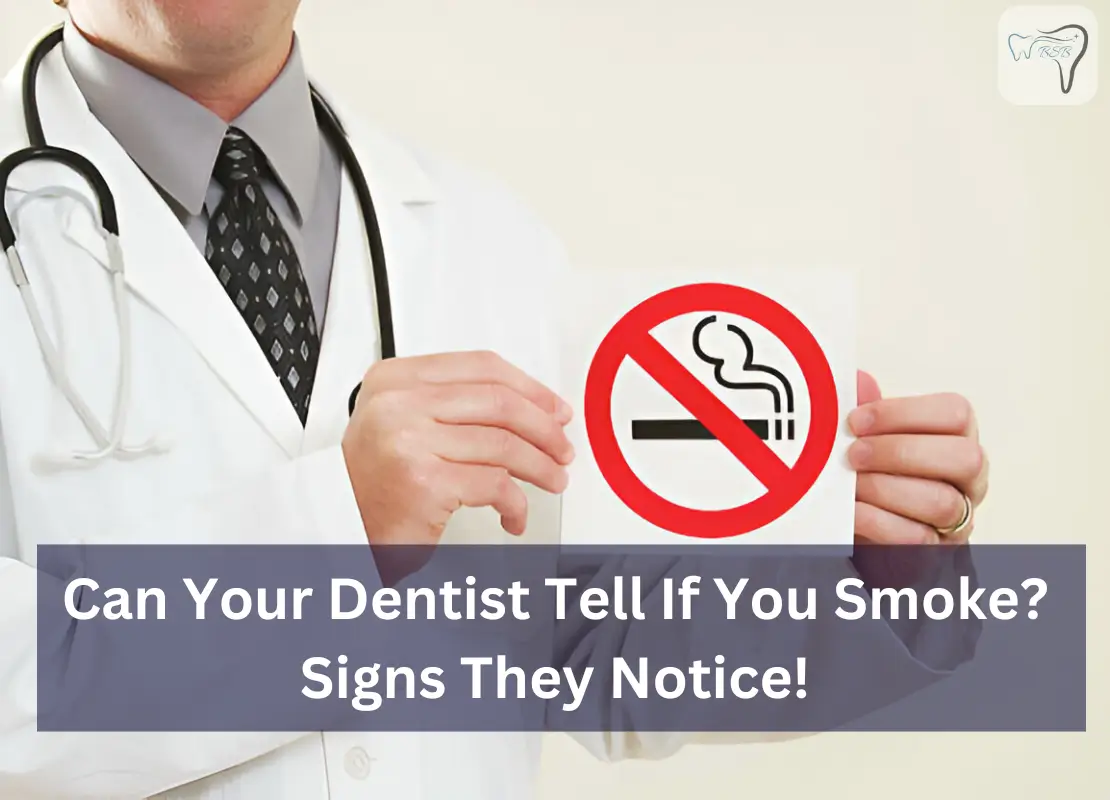Every dental exam reveals what patients try to hide from their parents. As a dentist and hygienist, we easily spot smoking and lifestyle habits through tooth discoloration, cavities, and oral health issues.
Despite pre-dental appointment dental cleaning, mouthwash rinses, and careful flossing, your mouth and teeth tell the truth about cigarettes and vapes use.
Can Your Dentist Tell If You Smoke? Signs They Notice!(Short Answer)
Signs of Smoking Visible to Dentists
Yes, your dentist can easily identify if you’ve been smoking. Here are several ways your dentist can detect if you’re a smoker:
- Discoloration of Teeth: Nicotine and tar from smoking cause yellowing or browning of teeth, making it noticeable to dentists.
- Bad Breath (Halitosis): The lingering tobacco smell leads to bad breath, a sign easily detected by dentists.
- Gum Disease: Smokers are prone to red, swollen, or bleeding gums, and dentists can spot signs of gum disease.
- Oral Lesions and Leukoplakia: Leukoplakia, white patches caused by smoking, can be identified by dentists as precancerous lesions.
- Delayed Healing: Dentists notice delayed healing in smokers, especially after oral surgery or tooth extractions.
- Build-Up of Tartar and Plaque: Smokers experience higher plaque and tartar build-up due to reduced saliva from nicotine.
- Nicotine-Induced Dry Mouth: Nicotine causes dry mouth, leading to difficulties in cleaning and higher risks of cavities.
Impact of Smoking on Oral Health
Smoking doesn’t only stain your teeth and cause bad breath; it can lead to significant long-term consequences for your oral health.
- Increased Risk of Oral Cancer: Smoking is a major risk factor for oral cancer. Dentists regularly check for signs of this condition during routine exams and often ask about your smoking habits due to the increased risk.
- Bone Loss: Smoking accelerates bone loss in the jaw, weakening the support for your teeth. This can lead to tooth loss and a variety of other dental problems that require treatment.
- Compromised Immune System: Smokers tend to have a weakened immune system, making it more difficult to fight off infections, including those that affect the mouth. This increases the risk of gum disease and other oral health issues.
I’m A Smoker. What Can I Do To Improve My Oral Health?
As a dentist, I’ve guided many people through quit smoking. While nicotine’s addictive nature triggers withdrawal symptoms like headaches, irritability, sore throat, and cravings, improving your health is worth the process of stopping that smoke habit.
Remedies for nicotine withdrawal include:
- Chewing sugar-free gum or sucking on mints helps distract from nicotine withdrawal cravings.
- Use nicotine replacement therapy like gum or the patch to ease withdrawal symptoms.
- Exercise can reduce cravings and improve your mood when they hit.
- Visit a place where you can’t smoke to break the smoking association.
- Replace your smoke break with a new routine to help manage cravings.
What About Vaping?
In my dental practice, I’ve noticed more people switching to vaping, believing it’s a safe alternative to tobacco. Don’t be misled – while vaping lacks tobacco, it still contains nicotine, leading to similar oral effects as traditional smoking.
From treating countless smokers, I can confirm that vaping causes identical health issues, including staining, dry mouth, tooth wear, and cavities.
I’ve Tried Quitting, And It’s Just Not Working Right Now. What Can I Do
If you can’t quit smoking now, focus on improving your oral health. Keep your mouth hydrated by drinking water. Regular brushing, flossing, and using sugar-free gum or mints help control bacteria and prevent decay.
Visit your dentist on a routine basis to catch problems early before they get bigger. Stick to these steps to protect your health.
Are Smoking & Vaping Bad for Your Teeth?
Smoking and vaping are bad for your teeth, mouth, tongue, lips, and throat. They increase risk of oral issues and cancers, with 90% of oral cancers linked to smoking. There’s not enough long-term data to be sure if vaping is better than smoking. Your dentist can tell if you smoke or use e-cigarettes like Juul during an exam.
Is Vaping Better for Your Teeth than Smoking?
Using vaping with non-nicotine ingredients could have less impact on health than smoking, but due to the lack of sufficient long-term data, we can’t be sure about the potential risks.
The Canadian Dental Association notes that:
- Vaping has been strongly linked to lung disease, raising concerns over its long-term effects on health.
- Contrary to popular belief, vaping has not been conclusively proven to aid people in their efforts to quit smoking cigarettes, leaving many unsure of its effectiveness.
- Early research indicates that certain vaping-liquid flavoring chemicals may cause damage to cells, potentially leading to further health risks.
Can My Dentist Help Fix What Smoking Did to My Teeth?
If smoking has damaged your teeth, your dentist can provide solutions based on your specific needs. A thorough exam is the best first step. Your dentist may recommend whitening for stained teeth, veneers, or an alcohol-free mouthwash for dry mouth. Chewing sugar-free gum and using nicotine-free vaping liquids can help with saliva production.
Regular cleaning, drinking water to rehydrate, and using a humidifier at night can also improve your oral health. If you grind your teeth at night, a mouthguard may be suggested.
Why It’s Important to Be Honest with Your Dentist
- Personalized Care: Being honest about your smoking habits allows your dentist to give personalized advice and treatment tailored to your oral health needs.
- Early Detection: Sharing your smoking history helps your dentist detect issues like gum disease or oral cancer in their early stages, making them easier to treat.
- Preventing Serious Problems: Honest communication allows your dentist to mitigate the effects of smoking and help you avoid bigger health problems in the future.
- Support for Quitting: Your dentist can offer guidance on quitting, recommending cessation programs or products to improve your oral and overall health.
Conclusion
Yes, dentists can easily detect smoking through signs like tooth discoloration and gum disease. Smoking and vaping significantly impact oral health, increasing the risk of cancer, bone loss, and infections. While quitting is ideal, maintaining good oral hygiene and regular dental visits can help manage the effects. Protect your smile by addressing smoking habits with your dentist.
Ferquently Asked Questions(FAQ’s)
Can dentists identify smokers?
Yes, dentists can detect smoking habits through yellow or brown stains on teeth, excessive tartar buildup, and gum recession. Signs of inflammation, bad breath, and delayed healing after dental procedures also indicate tobacco use.
Can a doctor tell if you smoke or not?
Yes, doctors can detect smoking through a blood test, which measures cotinine, a byproduct of nicotine. This test is the most reliable method for identifying both active smokers and passive smoking exposure.
How to identify smokers’ lips?
Smokers’ lips often show bluish-black discoloration due to reduced blood circulation and prolonged nicotine exposure. Dryness, wrinkles, and dark patches around the lip area are common signs in heavy smokers.

